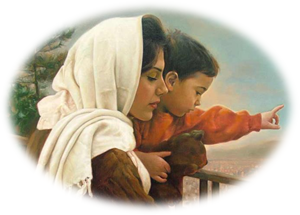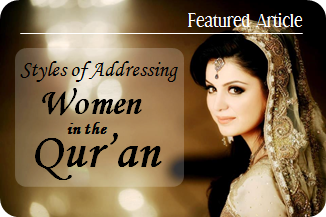


Polygamy - To Mothers of Orphans Only
No where in the Qur'an is it allowed to marry more than one wife for personal satisfaction. The verse regarding polygamy is set in the clear context of taking care of orphaned children. It specifies the only reasoning behind marriage to more than one woman:
Surah 4 - An-Nisa (Women), Verses 1 to 4
يَا أَيُّهَا النَّاسُ اتَّقُوا رَبَّكُمُ الَّذِي خَلَقَكُمْ مِنْ نَفْسٍ وَاحِدَةٍ وَخَلَقَ مِنْهَا زَوْجَهَا وَبَثَّ مِنْهُمَا رِجَالا كَثِيرًا وَنِسَاءً وَاتَّقُوا اللَّهَ الَّذِي تَسَاءَلُونَ بِهِ وَالأَرْحَامَ إِنَّ اللَّهَ كَانَ عَلَيْكُمْ رَقِيبًا
"People, be mindful
of your Lord, who created you from a single soul, and from it created
its mate and from the pair of them spread countless men and women. Be mindful of Allah, in
whose name you ask one another of what is in the womb,
Allah is always
watching over you". (4:1)
وَآتُوا الْيَتَامَى أَمْوَالَهُمْ وَلا تَتَبَدَّلُوا الْخَبِيثَ بِالطَّيِّبِ وَلا تَأْكُلُوا أَمْوَالَهُمْ إِلَى أَمْوَالِكُمْ إِنَّهُ كَانَ حُوبًا كَبِيرًا
"Give orphans their property, do not replace their good things with the bad, and do not consume their property with your own. That is a serious crime". (4:2)
وَإِنْ خِفْتُمْ أَلا تُقْسِطُوا فِي الْيَتَامَى فَانْكِحُوا مَا طَابَ لَكُمْ مِنَ النِّسَاءِ مَثْنَى وَثُلاثَ وَرُبَاعَ فَإِنْ خِفْتُمْ أَلا تَعْدِلُوا فَوَاحِدَةً أَوْ مَا مَلَكَتْ أَيْمَانُكُمْ ذَلِكَ أَدْنَى أَلا تَعُولُوا
"If you fear that you will not
be just/equitable to the orphans, then marry as permissible for you,
women, two, three or four. But if you fear you will not be equitable,
then one or to whom you are committed to by oath. That is better so that
you
do not deviate from the right course". (4:3)
Firstly, the verse of 'polygamy' is clearly embedded within the context of taking care of orphans. Where 4:3 is the 'verse of polygamy', the issue of orphaned children starts from 4:2.
Secondly, reading 4:3, we notice the verse begins by laying a clear condition, "If you fear that you will not be just/equitable to the orphans, then marry...". The underlined word "then" is the translation for the word "fa / ف". This term used to mean "in that case / so / then" is connecting the two portion of marrying more than one woman, and being more equitable to orphans, in a conditional manner. Even to an un-trained reader, it is very obvious to notice that Allah is stating here that the verse is 'permitting' another marriage only in order to be more "just / equitable" to orphaned children, in other words, to take care of orphaned children better. Orphaned children who have lost their father need care when their widowed mother is unable to provide for them. How can marrying again solve the problem of helpless orphaned children who are not provided for (e.g. food and shelter)? Ofcourse, it is by marriage to the widowed mother to whom the orphans belong to - who is also in need of provision.

The Qur'an only allows polygamy so that orphaned children
as well as their mothers are provided for.
The discussion of orphans and their care continues well into Surah An-Nisa further emphasising that marriage to more than one woman is only permitted in the unique case stated very explicitly within the verse itself. The next few verses following the 'verse of polygamy' 4:3, are shown below for readers information:
وَآتُوا النِّسَاءَ صَدُقَاتِهِنَّ نِحْلَةً فَإِنْ طِبْنَ لَكُمْ عَنْ شَيْءٍ مِنْهُ نَفْسًا فَكُلُوهُ هَنِيئًا مَرِيئًا
"And give women their property willingly, and if they remit any of it to you of their own will, then you may take it with a clear conscience." (non-literal). (4:4)
وَلا تُؤْتُوا السُّفَهَاءَ أَمْوَالَكُمُ الَّتِي جَعَلَ اللَّهُ لَكُمْ قِيَامًا وَارْزُقُوهُمْ فِيهَا وَاكْسُوهُمْ وَقُولُوا لَهُمْ قَوْلا مَعْرُوفًا
"And do not give the immature ones their money which Allah has entrusted to you, and spend on them from it and clothe them, and speak to them in goodness." (4:5)
وَابْتَلُوا الْيَتَامَى حَتَّى إِذَا بَلَغُوا النِّكَاحَ فَإِنْ آنَسْتُمْ مِنْهُمْ رُشْدًا فَادْفَعُوا إِلَيْهِمْ أَمْوَالَهُمْ وَلا تَأْكُلُوهَا إِسْرَافًا وَبِدَارًا أَنْ يَكْبَرُوا وَمَنْ كَانَ غَنِيًّا فَلْيَسْتَعْفِفْ وَمَنْ كَانَ فَقِيرًا فَلْيَأْكُلْ بِالْمَعْرُوفِ فَإِذَا دَفَعْتُمْ إِلَيْهِمْ أَمْوَالَهُمْ فَأَشْهِدُوا عَلَيْهِمْ وَكَفَى بِاللَّهِ حَسِيبًا
"Test orphans until they reach marriageable age; then if you find they have sound judgement, hand over their property to them. Do not consume it hastily before they come of age. If the guardian is well off, he should abstain from the orphan's property, and if he is poor he should use only what is fair. When you give them their property, call witnesses in, but Allah takes full account of everything you do." (4:6)
And the Qur'an continues to address the orphans care and protection. It is striking just how much Allah emphasises on the protection of such children.
Believing Men Marry only Once by Default
From Quranic point, believing men should marry only once as normal practice. We know this due to few reasons. One of them is that Allah states:
"Marry those who are single among you including the righteous ones from your male and female servants." (Qur'an 24:32)
Polygamy involves marriage to a man who is not single, therefore it is an exception only in the interest of taking care of orphans (marrying their mothers) - an exception, not a norm. Also, marriage is encouraged in the Qur'an and marrying once in the 'normal manner' (once) fulfils this. Yet, what is in 4:3, is stated in exceptional terms: in terms of orphaned children's care (their mothers).
Note: Marrying a single mother is not restricted to polygamous marriages. A never-married true believing man may wish to marry a woman who already has children but has lost her husband (through death or even divorce). This has great virtue in the sight of Allah due to the immense emphasis the Qur'an places on orphaned children and their care. A divorced mother's situation often parallels with a widowed mother's situation by virtue of her children. Such a deed from a believing man is highly noble - particularly as the Qur'an shows that having own children is a worldly deed like making money (18:46), and which does not bring one close to Allah nor count as a good deed in Hereafter (34:37). See QuranicPath article Is Having More Children Islamic? It is very surprising that some so-called Muslim men even divorce their wives for not being able to give them children - an evil action accountable in the Hereafter done in order to gain something purely worldly like money {18:46}.
Also notice that in 4:3, Allah has explicitly stated that believing men should only be married to one woman in the circumstance shown, and it is better this way:
"...then marry as permissible, women, two, three or four [i.e. widowed women with children in need of provision]. But if you fear you will not be equitable, then one. That is better so that you do not deviate from the right course." (4:3)
Thus, a single marriage is indicated as the norm. Marriage to a widow (in the interest of caring for orphans) is the exception this verse is making.
Understanding "if you fear you will not be equitable/just, then one."
The verse reads "فان خفتم الا تعدلوا فواحدة / if you fear you will not be equitable/just, then one". Thus, a stipulation clearly laid in the verse, is the issue of equitability and fairness between existing wife and subsequent marriage to mothers of orphans. We need to pay special attention here due to what many traditionalists have claimed in their literature. Since traditionalists' motive is to establish that men can marry any women up to four for personal desire / satisfaction, they try to impose a very shallow and biased understanding of what constitutes 'fair / equitable' in the verse. They claim that as long as a man can provide food, housing, clothing (i.e. material provisions) to equal amounts to all wives, he is being equitable and just. They say in that case he is meeting the requirement of the verse and can marry more than once up to four. Thus they have passed "fatwas" (verdicts) where they state that "permission" is not necessary from first wife for the husband to marry more wives (to any women). In other words, even against the first wife's happiness, the husband can marry again. Many such traditional so-called Muslims have done just that and bought depression upon their first wives.
This is an understanding lacking wisdom and knowledge. Because to be 'just' and 'equitable' is not only about providing material provision, it is also about being just to someone emotionally. If we take two people and emotionally torture one, then that is unjust - to consider simply providing material provision to equal level to be part of equality is pure ignorance - it is also about what you are doing to someone mentally.
Thus, if the first wife is against the idea of her husband marrying a second time (even to take care of orphaned children, to a widow), then her wish must be respected to comply with the verse (the part "if you fear you will not be equitable/just, then one"). If the husband marries against her wishes, then he is emotionally harming her (and is being 'unjust'), thus violating the verse. Supposing the second wife-to-be is happy with the man's second marriage while his existing wife is against this, then this is not being 'just' or 'equitable' between the two since one will be made happy and the other angry and upset.
Such shallow and thoughtless derivation of Quranic verses by these traditionalists portray a worrying element in their own marital relationships - since we see that in their interpretations, consideration of human beings' emotions, the wife's feelings or thoughts are completely overlooked and neglected, and an emotionless interpretation is spread that benefits only themselves. The reasoning for this is as stated, their preconceived motive of justifying marrying more women for personal or sexual gratification. Ideas of women's role as an obedient sexual tool for 'hyper-sexual' men is spread widely through extra-Quranic sources in the name of true religion, and is not based on the Quranic religion. In the Qur'an, the relationship between husband and wife is stated in following terms:
"One of His signs is that He created for you spouses like your selves so that you may live with them with affection and mercy - there are signs in this for people who reflect". (Qur'an 30:21)
Ofcourse, there is no affection, nor mercy in a husband ignoring his first wife's feelings and thoughts.
Understanding of "...marry as permissible for you / فانكحوا ما طاب لكم"
Allah has prohibited marriage between close relative members:
"And do not marry whom your fathers had married, except what has already been done. It is a lewdness, and an abhorrence, and a evil way. Forbidden for you are your mothers, and your daughters, and your sisters, and the sisters of your father, and the sisters of your mother, and the daughters of your brother, and the daughters of your sister, and your foster mothers who suckled you, and your sisters from suckling, and the mother-in-laws, and your step-daughters who are in your lodgings from your women with whom you have already consummated marriage; if you have not consummated the marriage then there is no sin upon you; and those who were married to your genetic sons. Also (forbidden) that you have two sisters together, except what has already been done. Allah is Forgiving, Merciful." (Qur'an 4:23)
So when Allah says in 4:3:
"If you fear that you will not be just/equitable to the orphans, then marry as permissible for you (انكحوا ما طاب لكم), women, two, three or four." (4:4)
"Marry as permissible for you / فانكحوا ما طاب لكم" is referring to restrictions laid to whom marriage is permissible in 4:23. These restrictions still apply, even in the case of a widowed woman in need of provision for her children. It may be that a believing man cannot marry a widow or does not want to for whatever reason. it is important to bear in mind as believers, that it is not necessary to marry a widowed woman to be charitable and kind to her. Throughout the Qur'an, being charitable and looking after the needy and especially fellow believers have been shown as a clear attribute of those who love Allah and follow the Qur'an.
Most so-called Muslims simply do not look at the Qur'an and just go along with what they hear or read in textbooks about the Qur'an. By studying the actual verses, we have noticed striking points, which have been deliberately hidden away from Muslims by the clergy.
Deceptive Methods Used
The traditionalist preachers of this verse use many tactics in an attempt to establish their desired interpretation, that is that men can marry any women up to four wives. Some of the common tactics are as follows:
● In a translation, inserting the word "other" in a bracket so that the verse reads "marry (other) women", in order to disconnect the condition stated in the actual Arabic Qur'an. The word "other" is ofcourse, not in the actual Qur'an (rather the contrary "fa ف / then" is used to link the two together, "If you fear that you will not be just/equitable to the orphans, then ("fa ف") marry as permissible for you, women, two, three or four.")
● In speeches and sermons, they deliberately omit the first half of the verse, which stipulates the condition. They begin quoting the verse from "marry as permissible, women, two, three or four" after telling the audience that men can marry four wives, any women (not widows), for any reason.
● And general 'brainwashing' of Muslims into thinking that the Qur'an can only be understood / interpreted by those special scholars (who are the ones spreading such misunderstandings) - they shall not question what they read, and the majority is correct.
In conclusion, the following is deduced from the Qur'an:
1) Marriage to more than one woman is not for personal or sexual gratification at all. It is permitted only to mothers of orphans in the interest of taking care of orphaned children, who otherwise, would not have basic provisions such as food, shelter etc.
2) Even if it is in the interest of taking care of orphaned children, the first wife's happiness and opinion takes priority and the believing husband will not marry the widowed woman against first wife's will / happiness.
3) Though only mothers of orphans who are in need of care and protection is allowed, "Marry as permissible for you / فانكحوا ما طاب لكم" is referring to only those such widowed women who are permissible for marriage.
There have been many men, even in modern days who, in the name of being a "Muslim", marry against their first wives' wishes and there are first wives who are depressed due to inconsiderate nature of the husband. These men are in violation of all the teachings of the Qur'an described in this article. Not only did they marry against their first wives' will, the women they married are not widows with children. Their intention was purely self-gratification, not to take care of orphans, claiming that their existing wives must also obey their whims as a commandment of Allah. See The Myth that Women have to "Obey" their Husbands.
Marrying More Women to Amass More Children
The traditional circle also teach it is permissible for a man to marry second or more times if his wife is barren. They even claim that even if she is fertile, he may practise polygamy if he wants to produce more children than his existing wife can endure giving birth to. We have seen that polygamy is only an exceptional rule for the sake of taking care of orphans. Here they teach that to make more of own children, they can resort to polygamy!
The additional violation is that the Qur'an does not encourage having own children! Allah reveals that having children is not what draws one near to Allah in anyway or gives reward:
"Neither your wealth nor your children will bring you near to Us, but those who believe and do good deeds will have multiple rewards for what they have done, and will live securely in lofty halls." (Qur'an 34:37)
"Wealth and children are the attractions of the life of this world. But the good deeds which endure are better in your Lord's sight and better in respect of hope." (Qur'an 18:46)
On the contrary, what is truly rewarding and highly acclaimed in the Qur'an is raising orphaned children - a selfless act where no personal stakes are involved. And to this, Allah dedicates many verses.
"What will explain to you what the steep path is? It is to free a slave. To feed people in days of shortage. To bring the orphans near as well as the dust-ridden poor. Only then he would become one of the believers, who exhorts people to the truth and to kindness. These are the companions of the right". (Qur'an 90:8-15)
In line with the encouragement of raising of orphans and ensuring the protection of their inherited wealth and identity, the Qur'an permits polygamy as an exception.
From the QuranicPath Article: Is Having More Children Islamic?
True believing men abide fully by the sublime morals of the Qur'an. In cases where the actual Qur'an is followed thoroughly, without deviated teachings that go contrary to Quranic teachings, all believers on this path lead a peaceful and content lives.
"But when the righteous are asked, 'What has your Lord sent down?' They say, 'all that is good'. There is good in the world for those who do good, and the abode of the Hereafter is even better. How excellent is the home of the righteous!" (Qur'an 16:30)
See Also:

Copyright © , QuranicPath. All Rights Reserved.

